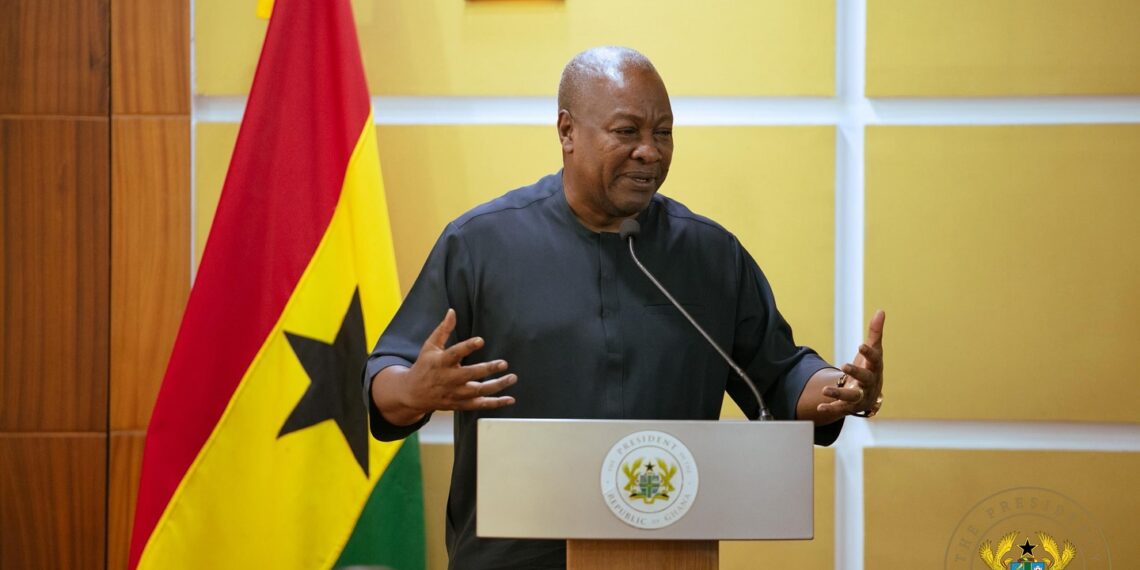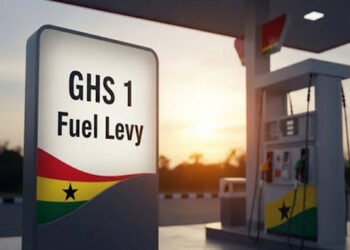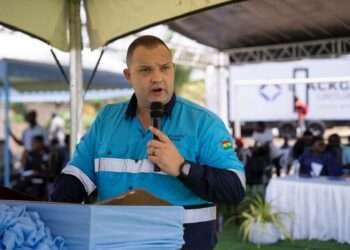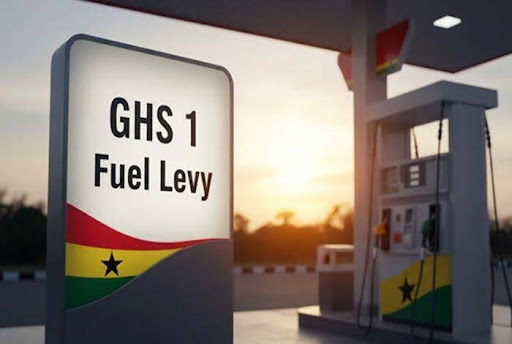In a pivotal meeting at the Jubilee House, His Excellency President John Dramani Mahama welcomed the Ghana National Association of Teachers (GNAT) for a courtesy visit, an occasion that transcended mere formalities to become a significant platform for candid dialogue on the nation’s trajectory.
The President expressed profound gratitude for GNAT’s congratulations on his electoral victory, acknowledging it as a “bonus” that further affirmed the public’s confidence in his administration.
He immediately delved into the profound challenges confronting Ghana upon his assumption of office, asserting that his government entered the fray “under no illusion about what the problems of Ghana were.”
“We took over, confronted with several issues, but we’re under no illusion about what the problems of Ghana were, and so we came prepared to make the sacrifices to tackle any challenges that we were facing.”
HE President John Dramani Mahama
The extensive discussions touched upon critical pillars of national life: democratic governance, economic stability, and, notably, a comprehensive vision for the education sector, with teachers at its very heart.
President Mahama articulated a deep concern regarding the state of Ghana’s democratic governance, a system that has been in practice since the adoption of the 1992 Constitution.
He recalled the initial euphoria surrounding the democratic transition, a collective hope that democracy would usher in an era of transformation and prosperity.
However, several years into this democratic experiment, the President highlighted a worrying trend revealed by various opinion polls, particularly those conducted by Afrobarometer.

Restoring Faith in Democracy
These surveys, he noted with gravity, indicated a clear and unsettling erosion of public confidence in the nation’s governance and democratic institutions.
“And indeed in one of the surveys they did, there was a very good, significant majority of people, up from previously who were prepared to go back to military dictatorship as a preferred option to democratic governance.”
HE President John Dramani Mahama,
This grim reality, President Mahama underscored, formed a central theme in his last campaign, where he warned that the current period might represent “our last opportunity to restore the faith of our people in democratic governance.”
Failure to seize this moment, he cautioned, could lead to “something untoward,” potentially civil unrest, which he grimly noted could be “even worse than a military coup” if citizens chose to render the country ungovernable.
According to him, it is with this profound understanding of public sentiment that his administration embarked on a mission to “restore confidence in our governance and democracy,” a commitment immediately evident in the establishment of the National Constitution Review Committee.
The committee, the President noted, is tasked with meticulously reviewing previous constitutional reform reports and recommendations from various eras, including those formed by the late Professor Mills, led by Prof. Fiadjo, and the one established by former President Nana Akufo-Addo.
These, he noted, are to be incorporated in the white paper and recommendations of the constitutional review implementation committee, to ensure the 1992 Constitution remains a “living document” reflective of the people’s evolving expectations.
Economic Reset
Beyond governance, the President also provided an update on the nation’s economic landscape, an area he stressed required a comprehensive “reset.”
He proudly announced that the National Economic Dialogue, a key initiative, had recently presented its report, with some of its recommendations already incorporated into the March budget.
A central tenet of these recommendations, and a core focus of his administration, is an unwavering commitment to fiscal discipline.
Past experiences, he acknowledged, have demonstrated how fiscal indiscipline can destabilise the macroeconomic environment, leading to a depreciating currency, inflation, and a consequent decline in the quality and standard of living for all Ghanaians.

A stable and predictable macroeconomic environment, he posited, is crucial for fostering investor confidence and enabling businesses to plan effectively.
“An appreciating currency, a strong, stable currency, also improves our earnings because if I were earning GHS 5,000, and the cedi was going for GHS16 to $1. It means I’m earning about $300, but currently with the Cedi at GHS 10.5, it means that the same GHS 5,000 is almost $500, about $480 or something like that.”
HE President John Dramani Mahama,
This improvement, he argued, is a direct outcome of economic stability. Furthermore, he shared encouraging news regarding the first quarter GDP results, which registered a robust 5.4% growth.
This figure, he highlighted, is a strong indicator that the economy is returning to a path of positive expansion, a welcome contrast to previous negative growth trends.
His administration remains vigilant, committed to maintaining this growth trajectory to ensure sustained stability and increased prosperity for all Ghanaians.
Charting Quality Education
Shifting focus to the critical education sector, President Mahama emphatically declared that the government and GNAT are “partners in education,” expressing profound appreciation for the union’s invaluable contributions.
He warmly acknowledged GNAT as “one of the biggest stakeholders in the education sector,” indeed, the “father of all teacher unions,” recognising its long-standing legacy and pivotal role in shaping the nation’s educational landscape.
He underscored the fundamental truth that “a happy, well-motivated teacher leads to positive learning outcomes for our children,” pledging continued close collaboration with GNAT to “improve the conditions of service of teachers so that teachers are treated with respect.”
This commitment was immediately translated into tangible policy directives. He reiterated the Education Minister Hon. Haruna Iddrisu’s announcement of a new policy mandating that every basic school constructed must now include “accompanying accommodation for teachers,” ensuring that teachers have dignified housing attached to their learning environments.
Furthermore, President Mahama revisited a pre-election promise: a collaborative housing scheme for teachers. He proposed that the government would make a counterpart funding contribution to the existing Teachers’ Fund, enabling members to apply for affordable housing.
Drawing lessons from past “affordable housing” initiatives that often became inaccessible to the poor, he advocated for “low-cost housing,” reminiscent of the Acheampong era, which saw widespread construction of such units.

The vision is to design these homes collaboratively with GNAT and build them, allowing teachers with a working life of 15 to 20 years to incrementally pay for their homes through monthly salary deductions, thereby ensuring they “own the house” upon retirement and can “retire in dignity.”
“They don’t have to go and quarrel with their families about whose grandmother’s room it was or the argument that it was my grandmother who built this room, and all that.
“We believe that they should be able to retire in dignity. And so it’s something that the minister of education will take up with you, so that we can design it”.
HE President John Dramani Mahama,
He expressed optimism that an announcement regarding this significant initiative could be made at GNAT’s “big meeting” at the beginning of 2026.
Pensions Reforms
On the complex issue of pensions, President Mahama acknowledged ongoing dissatisfaction among various unions, including GNAT, despite previous reforms.
He announced an upcoming meeting with the TUC and organised labour to discuss these concerns.
Recognising that “it’s been several years since we brought the pension reform,” he proposed a comprehensive review conference to assess what aspects are functioning effectively and where adjustments are needed to ensure “everybody feel happy about it.”
Moreover, drawing from the National Education Forum reports, the President highlighted decentralisation as a key area for improvement.
He emphasised that greater decentralisation would lead to “better supervision at the district level and better quality outcomes” in schools, as it is inherently “easier for the education service to supervise and monitor schools at the district level than for us to try and do it from the center.”
Another crucial point from the report, which the President felt “very scandalised” about in its absence, was the imperative to fully restore “community and PTA participation in the management of schools.”

He asserted that the global trend dictates giving communities a significant say in the operation of their schools, particularly at the secondary level.
“And so I believe that PTA participation must be fully restored so that they work with teachers and the administration of the schools to make sure that the schools are run properly and that our children are getting a good outcome, in terms of teaching and learning.”
HE President John Dramani Mahama
GNAT’s Entrepreneurial Success
In a notable shift to GNAT’s entrepreneurial ventures, President Mahama extended his congratulations on the association’s acquisition of the Sweden Ghana Medical Centre.
He expressed the government’s readiness to “collaborate with you and see how we can make it a centre of excellence,” not just for teachers, but for all who require its specialised care, particularly in the face of rising non-communicable diseases.
He saw a natural synergy between the centre and the Ghana Medical Trust Fund, particularly in alleviating the burden of expensive cancer treatments and diagnoses.
Furthermore, the President expressed pride in GNAT’s continued majority shareholding in Aviance, a ground-handling company, recalling former President Mills’ encouragement for Aviance during a period of foreign investor withdrawal.
He strongly encouraged GNAT to continue with its shareholding, hinting at the possibility of eventually owning “the whole of Aviance and have a monopoly on ground funding at our airports.”

He reinforced the idea that Ghanaians possess the capacity to manage such essential services without constant reliance on foreign entities.
He concluded by commending GNAT for its impressive growth in investments, recognizing that such ventures provide “stability to the association” and enable it to offer “better opportunities and service to your members.”
President Mahama concluded his address by reiterating his congratulations and thanks for the visit, marking a productive dialogue that outlined key priorities and collaborative pathways for the future of Ghana.
READ ALSO: ECG to Begin Nationwide Revenue Mobilisation Drive from June 16




















